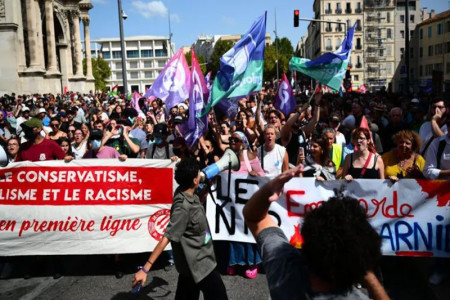His appointment follows an inconclusive election in which the left-wing bloc - the New Popular Front (NPF) - won the largest number of seats.
The protests were called by trade unions and members of the NPF, who are furious that their own candidate for prime minister was rejected by President Emmanuel Macron.
Mr Barnier, the EU's former Brexit negotiator, said he is open to forming a government with politicians across the political spectrum, including the left.
The interior ministry said 110,000 protested nationwide on Saturday, including 26,000 in Paris, though one protest leader claimed the figure was 300,000.
Jean-Luc Mélenchon, a veteran firebrand from the radical France Unbowed party, called for the "most powerful mobilisation possible" in national marches.
Around 130 protests were scheduled, with the biggest setting out from central Paris on Saturday afternoon.
Mr Mélenchon joined the Paris protest, giving a speech on the back of a float emblazoned with the slogan: “For democracy, stop Macron’s coup”.
The demonstrators are also using slogans such as "denial of democracy" and "stolen election".
Parties on the left are angry that their own candidate for prime minister, Lucie Castets, was rejected by Mr Macron, who said she had no chance of surviving a vote of confidence in the National Assembly.
Mr Barnier may be able to survive a confidence vote because the far right, which also won a large number of seats, has said it won't automatically vote against him.
That has led to criticism that his government will be dependent on the far right.
"We have a prime minister completely dependent on National Rally," Ms Castets said.
Mr Barnier spent Saturday afternoon visiting a children’s hospital in Paris, where he highlighted the importance of public services, but told healthcare workers his government "is not going to perform miracles", local broadcaster BFMTV reported.
Against the backdrop of the protests, the new PM is focussed on forming a new government.
After talks with the leaders of the right-wing Republicans and the president's centrist Ensemble group, he said discussions were going very well and were "full of energy".
Some on the left have blamed themselves for ending up with Mr Barnier as prime minister.
Socialist Paris Mayor Anne Hidalgo pointed out that the president had considered former Socialist prime minister, Bernard Cazeneuve, for the job but that he had been turned down by his own party.
Another Socialist Mayor, Karim Bouamrane, blamed intransigence from other parts of the left alliance: "The path they chose was 100% or nothing - and here we are with nothing."
Hafsa Khalil


